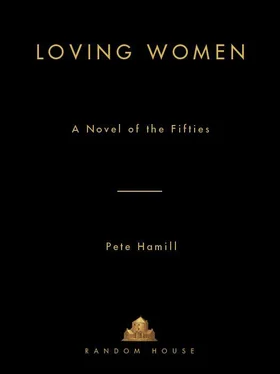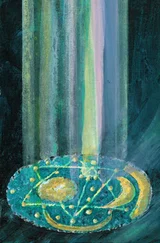The shade was up. But all I could see were crates.
I moved carefully along the perimeter of the field. I saw no guards. Not even at the dumpster. I went out through the hole in the fence into the woods, circled to the highway and slipped into the locker club. I hung my uniform on a wire hanger. Then, dressed in sport shirt and chinos, carrying the small bag, I went behind the locker club and stayed in the shadows, moving west. There was a river to cross, a chance of capture, and I was afraid. I was doing something now that would change everything. Doing this, I could land in the brig or become a fugitive for all the years of my life.
But there was no real choice.
I was going to New Orleans.
To find my loving woman.
I stopped at the gravel road that led to the trailer and for a moment considered staying there for the night: to sleep one final time in the tight small bed where Eden changed me and maybe I changed her. But then I saw lights burning dimly beyond the trailer, and I moved on, safe in the darkness. By dawn, I wanted to be far from Ellyson Field.
I walked for a long time. I trudged past the railroad trestle where Eden once stood in her red shoes and tempted or terrified some railroad men. For the moment, hitchhiking was out; I couldn’t risk being picked up by Buster and his cruising friends, didn’t want to be spotted by anyone who might recognize me from the base. If that Marine died from his beating, they’d want me for more than being AWOL. The word manslaughter chilled me again. And I wished I could just disappear. If I was never seen or heard from again, what difference would it make to the world? I was nobody. Nameless. Faceless. Walking to New Orleans, with seventy-eight dollars in my pocket. What was important to me didn’t matter to anyone else in the world except Eden. Possibly not even to her. But I would get there. I would find her. Even if I had to walk all the way.
The hours went by. The lights of a thousand cars flashed past while I moved behind a screen of bushes and billboards. Then up ahead I saw a road sign saying Foley and I knew I’d walked into Alabama. My legs felt heavier. My feet hurt. Enough . Now I’d have to take the chance of hitchhiking. I stepped out on the road, trying to look like a sweet all-American boy and not some trunk murderer. After a while a dark-blue pickup stopped, the engine racing. An old man was behind the wheel, thin and toothless and smiling.
“Hurry up, sailor,” he said. “I ain’t got all goddamn night.”
I got in and he put the truck in gear and started tearing down the road, wavering from time to time, heaving up gravel from the shoulder. The radio was tuned to a black station. Hank Ballard. Work with Me, Annie . They used to sing it in the Kingdom of Darkness, everybody stopping to shout the chorus.
“How’d you know I was a sailor?” I said.
“Hitchhikin in these parts, you ain’t no Royal Canadian Mountie. Course, I ain’t no Sherlock Holmes either. Just, I drive these damn roads all the time and that’s who I see. Sailors. Most you people look the same. Where you fum?”
“Miami,” I lied.
“Lots of Jews down there, ain’t they?”
“Some.”
“Hell, they’s Jews all over nowadays. I seen them even in Memphis . Can you beat that?”
“Amazing. Memphis …”
“Where you bound fer?”
“Mobile. The bus station.”
“I’ll drop you off.”
We were on a four-lane road now and all around us I could see marsh grass writhing under the graying sky. The air was thickening with heat. A mosquito landed on my arm and I slapped it and the old man laughed. “Skeeters down here big enough ta play basketball with,” he said. I laughed too. Then we were on a causeway, shooting out over the swamps. “Six miles long hit is,” the old man said. “One of the longest damn bridges in the world.” He told me his name was Woods. I said my name was Lee. I was surprised how easy it was to make up names and places and histories.
The black radio station faded and Woods fiddled with the dial and found another one. Lloyd Price. “Love that damned nigger music,” he said, as Lloyd Price shouted his delight with Miz Clawdy. “Ho, boy !” He slammed the dashboard with the palm of his hand and moved against the rhythm as he drove. Up ahead was the Bankhead Tunnel. He slowed down and fumbled for change to pay the toll. I handed him a dime.
“Thanks, sailor,” he said, palming the coin.
I could see cops around the change booth. And I thought: They could be looking for me . For killing that Marine guard, that Gabree. I thought about feigning sleep but decided it was easier simply to look casual. The cops were bored and tired, with big sweat stains under their arms. Woods handed over his dime and we eased into the traffic as Billy Ward began to sing Sixty-Minute Man . I wondered where Bobby Bolden was and whether he did much thinking about the rest of his life.
The tunnel was two lanes wide, with a few cars coming at us in the other lane. Woods moved the truck smoothly, both hands gripping the wheel. He didn’t drift. Not down there. Then he started to pick up speed. The tiled walls were dripping with summer perspiration. I had a feeling that we would come up on the other end in Manhattan. I’d see the Hudson behind me and the docks of the ocean liners and the Empire State Building off to the left. The faces would be familiar. There would be plenty of Jews. And black people too. And Puerto Ricans. I’d thank Woods and get out of the truck and go to the newsstand on the corner and buy the News and Mirror and the Journal-American . Maybe I’d take the train to Ebbets Field. The Dodgers would be playing the Cardinals. And when the game was over, I’d go down to Coney Island and buy some hotdogs at Nathan’s and walk out to the beach and look at the girls in their bathing suits, their skin still white with winter, and I’d call my father and tell him I was home, and I’d be there soon and none of this would have happened.
But when we came up out of the tunnel we were still in Alabama. Going farther and farther away from New York. And then I felt light, boneless, runny with fear; in a few hours, what I had done would be irreversible. Donnie Ray would call the roll and I would not be there. He would run through the motions, as he had the morning that Boswell didn’t show; but when he was certain I was gone, he would mark me AWOL. And I knew that I might never be able to go back to New York. I would never see my father and brothers, except from the shadows. I felt like crying.
Over on the left, jammed around the flat mouth of the Mobile River, I could see cargo ships tied to docks, being loaded with bauxite. The air smelled of salt. It was very hot and there was not yet a sign of the sun.
“Ugly goddamn place ain’t it?” Woods said.
“Depends,” I said.
“On what?”
“On whether you’re from here. Maybe if you’re from here, it’s beautiful.”
“ I’m from here, sailor. And I say it’s ugly .”
Then we were passing summer houses with bicycles lying on the lawns. The trees were plump and green. I saw at least one swimming pool. Woods made a series of turns and we were suddenly on Government Street, a main drag full of grand houses. We drove a few blocks under a high canopy of live oaks. We turned again, into a seedy treeless district, with For Rent signs in some of the stores. An abandoned car rusted in a side street, its tires gone, the windows punched out. And up ahead I could see the sign for the Greyhound station.
“There you are, sailor.”
“Well, I certainly appreciate the ride.”
Читать дальше












